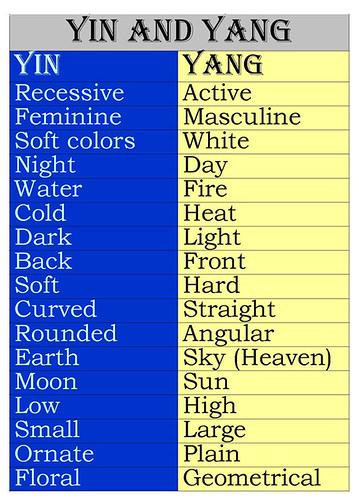Toby wrote: 1. I don't get the theory that the more soft and relaxed you are, the harder you'll hit (i.e. the more "yang" energy you'll be able to issue). It makes no sense whatsoever. We want to generate the maximum amount of force into our opponent and we will do that by building the most powerful machine we can, then refining that machine to issue its power in the smoothest, most efficient way. That's just the way we think about it anyway.
2.
Walter Joyce wrote:There could be many reasons, but the two that stand out are the notion that the concept of yin is harder to achieve in practice than yang and that a lot of people who are drawn to taiji are interested in this aspect, for a variety of reasons.
I would've thought the opposite, that "softness" is easier to achieve and that that's precisely why taiji appeals to the masses as a watered down health art. Because anybody can "practise" taiji, pensioners in the park can do it and it's a very easy low-impact, non-threatening, "yin" "sport" for them. Of course, whether they're actually doing taiji or learning a hollow shell of movements vaguely resembling taiji is debatable.
Thank you for answering my two questions. In response I'd first like to say that there is more than one path to the right result. I've labeled the issues above to make it clearer what issue I'm addressing.
Issue 2. You're right in that the softer or yin aspects of taiji are what draw most people who practice taiji who are not interested in its martial side. But as you also noted, if you define taiji as a martial art, the question in their training remains whether or not it is taiji quan they are practicing. If you define taiji as a martial art, and for purposes of this discussion I am, then the answer is no, without the martial aspect its not true taiji.
Also, if you define the highest level of taiji as the achievement of both the spiritual and the martial, then these "non-martial" taiji practitioners are not at the highest level. (See my post here:
viewtopic.php?f=3&t=141&start=135 for the source of this idea).
When I wrote what you quoted above my intended audience was the members of this board, who for he most part ARE interested in the martial side of taiji and may of whom, like myself, come to taiji with a background in other arts that do emphasize the Yang energy. For these people the softness or relaxed/alive state (sung) that is the basis of taiji training is much harder to achieve.
Issue 1. What I have found in my training, which as I stated before started with more physical based training based one "external" strength or methods, is that by pursuing only the Yang aspects I was limiting my potential. If Yang is hard, which I associate with tense, then at least half of the potential power in my strikes was being held back by tension. Even by relaxing to a lesser degree than is required by taiji I was able to increase that striking power.
If you look even at how boxers are trained, it is common knowledge that once a fighter has established power through "Yang" type training, the ability to relax is key to releasing their full power potential. So yes, like you now train, Yang training
can lead to Yin, if you let it.
I have never advocated only "internal" training for martial arts, I agree that there is a need for basic strength and athleticism if you want to fight, the question then becomes, how do you build those aspects.
When I finally met what I refer to as "authentic" internal martial artists and masters I noted that the power that they could deliver felt very different than anything I had ever felt, and was also more powerful than I ever felt. It was this that convinced me to explore the "internal methods", which as for most were just variations on standing meditation and breath exercises. It was though these methods that I began to fell a much deeper relaxation, which enabled me to find my structure of natural relaxed alignment. at that point my power increased even more, but more importantly, required less effort on my part. The added benefit of improved health and vitality was nice too.
So, where am I going with this?
As has been discussed on many thread before, you are right in that Yang practice/skill
can lead to Yin
if the practitioner makes a conscious effort to truly train and understand Yin .
And the corollary of that is that Yin practice/skill can lead to deeper Yang Yin
if the practitioner makes a conscious effort to truly train and understand Yang .
Which is consistent with the underlying theory of Yin and Yang, as I understand it.
So if you prefer Yang training, then enjoy it, but I do believe, as my own practice has shown me, that unless you strive to understand its opposite/complementary energy you will not reach your true potential.
Simple example: we need to work (Yang) to achieve things in this life, but without proper rest (Yin), we can not work to our true potential.
The deeper the rest, the deeper we can throw ourselves into the work.









